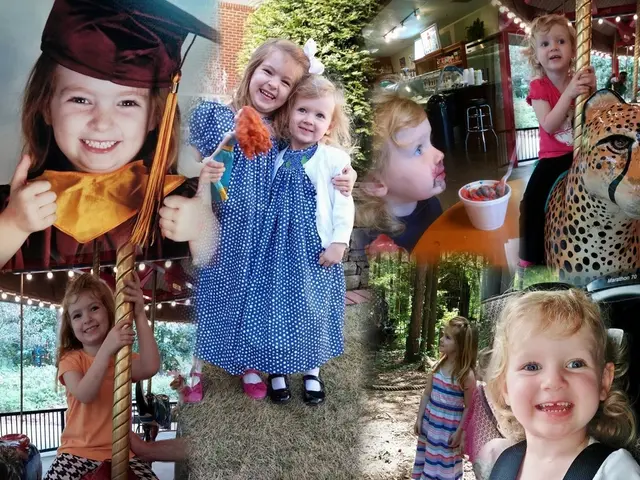The Invaluable Gift of Imagination and the Significant Price Paid Upon Its Demise
Unleashing the Power of Imagination:
Imagination, a Treasure Trove Misunderstood, Often Misjudged as Child's Play
In our rapidly advancing, mechanized world, imagination - once held as a sacred tool of human creativity - has been reduced to a whimsical, frivolous aspect of life, often associated with immaturity and a lack of serious, rational thinking. This distorted view has not only permeated our society but has also affected artists and creative individuals, who have faced criticism and dismissal at various stages of their lives.
The Descent of Imagination: A Historical Perspective
The origins of this decline can be traced back to a culture that has embraced a logic-centric, patriarchal society. Spiritual literature and neuroscience have long highlighted creativity as a predominantly feminine domain, residing more in the right hemisphere of the brain. As we delve into the annals of history, it becomes apparent that the last 200 years have witnessed a rise in "left-brain" ideologies, such as Fascism and the scientific philosophy known as 'logical positivism.' These ideologies have, indeed, fostered a chauvinistic, reductionist approach to life.
Imagination: The Yin to Reason's Yang, Powering Human Progress
If we were to chart the battle between logic and imagination from a historical viewpoint, it would become evident that it is our imagination that has propelled human progress. It is not our logical reasoning that led us from the caves to the modern world, but our ability to envision, to dream, and to create beyond the confines of the logical and the rational. While logic refines and structures ideas, it is imagination that allows them to flourish and grow.
Even in the realm of science, which is often perceived as the epitome of logic and analytical thinking, imagination has been the driving force behind the greatest theories and discoveries. The conjectures and ideas born of imagination are later validated or falsified using logic, mathematics, and experimentation. In essence, imagination is the engine that drives the world forward.
The Transforming Capabilities of Imagination: A Panacea for Modern Times
What we have misconstrued as flight of fancy is, in actuality, the transformative power of imagination. Yes, it can be playful and fun, but it is more than that. It can redefine our perception of the world, shatter our mental barriers, and inspire us to leap beyond the ordinary. Imagination is not merely the ability to conjure up images; it is the power to make something real from them.
Who Stole our Imagination, and Why?
The sad demise of our imagination remains a mystery, shrouded in the enigma of time. Some argue that the loss of our creative side is a given, a cyclical change that we are destined to experience. On a more practical note, our current education system, geared towards academic achievement rather than fostering innovative thinking, may bear considerable responsibility for this loss.
The more we delve into the implications of this loss, the more apparent it becomes that we are facing an opportunity cost, a potential that lies dormant, waiting to be unearthed. The practical applications of imagination extend far beyond the realms of art and symbolism, as we shall see.
The Operative Value of Imagination: A Multitude of Applications
From its role in inspiring positive change to its crucial function in problem-solving, healing, and motivating oneself, imagination plays a pivotal role in various aspects of our lives. Here, we delve into some of the practical applications of imagination:
Inspiring Positive Change
The power of imagination lies in its ability to 'see' the extraordinary in the ordinary, to perceive a different reality. By envisioning an alternate, improved self and world, we are inspired to break free from our current situation and strive for a better future.
Creating Your Destiny
By envisioning your possible future, you are crafting the blueprint for your journey. The energy and motivation to bring this imagined reality into being are ignited by the power of imagination.
Solving Problems
When it comes to problem-solving, imagination serves as the catalyst, allowing us to envision various outcomes and possibilities. In doing so, it complements rational thinking beautifully, providing alternative solutions that may not be readily apparent through deductive reasoning.
Healing Wounds, Inside and Out
The use of visualization and imagination has been central to ancient healing arts, as it allows individuals to condition their subconscious mind and alter emotional and physical manifestations. The interconnectedness of our physical, emotional, mental, energetic, and spiritual selves makes imagination one of the keys to unlocking our inner potential.
Motivating Yourself
The power of imagination extends to self-motivation as well. Whenever you set a goal in your mind and bring it to life through imagination, it sparks a profound emotional response, fueling your drive to bring that vision into reality.
Embracing Your Full Potential
The denial and suppression of imagination only serve to reinforce our fragmentation. Embracing imagination and using it to its fullest potential is crucial for personal growth and holistic development.
By Gilbert Ross
Enrichment Data:
Overall:
Several factors contribute to the suppression of creativity and imagination in modern society, particularly within education systems. Here are some key influences:
Factors Suppressing Creativity and Imagination
1. Standardized Education Systems
- Emphasis on Standardization: Modern education often focuses on standardized testing and curriculum, which can limit the freedom for diverse and creative thinking. This emphasis on conformity discourages students from exploring unconventional ideas.
- Pressure for Uniformity: The push for uniform academic achievements can lead to a narrow focus on established methods rather than innovative approaches.
2. Hierarchical and Rules-Based Environments
- Cognitive Entrenchment: In rules-heavy environments, expertise can lead to cognitive entrenchment, where professionals become entrenched in traditional methods, stifling creative exploration[5].
- Risk Minimization: The fear of errors in standardized industries can suppress creativity by limiting opportunities for risk-taking and experimentation[5].
3. Economic and Social Pressures
- Economic Constraints: Economic pressures can prioritize practical career paths over creative pursuits, leading students to choose more "stable" fields rather than exploring artistic or innovative careers.
- Social Expectations: Society often places high expectations on individuals to conform to certain norms, which can discourage nonconformist thinking and creativity.
4. Lack of Diverse Perspectives
- Narrow Perspectives: Educational systems often lack exposure to diverse perspectives, which are crucial for fostering creativity by introducing students to a wide range of ideas and experiences.
- Limited Encouragement of Unpopular Ideas: The suppression of unpopular ideas in educational settings can limit the exchange of creative and innovative thoughts[3].
5. Cultural and Institutional Frameworks
- Symbolism and Exclusion: Economic and social systems can perpetuate closed hierarchies that exclude marginalized voices, further limiting the pool of creative contributors[1].
- Institutional Barriers: Institutional barriers, such as bureaucratic processes and rigid structures, can hinder the implementation of innovative ideas within educational institutions.
To address these issues, strategies such as introducing flexible learning environments, encouraging diverse perspectives, and promoting risk-taking within safe boundaries can help foster creativity and imagination in modern education systems.
- The power of imagination is not just a realm of play and frivolous ideas; it is a transformative force that can shatter mental barriers and inspire us to leap beyond the ordinary.
- Imagination has a pivotal role in problem-solving, healing, and motivating oneself, extending beyond the realms of art and symbolism.
- In the realm of fashion-and-beauty, food-and-drink, home-and-garden, or even relationships, imagination can provide alternative solutions that may not be readily apparent through deductive reasoning.
- In the realm of healing, imagination, through visualization, has been central to ancient healing arts, conditioning the subconscious mind and altering emotional and physical manifestations.
- In our rapidly advancing world, reclaiming our imagination is crucial for personal growth, as it offers a panacea for modern times, a means to redefine our lifestyle, relationships, and even our personal pets, travel experiences, and perhaps the cars we drive.







